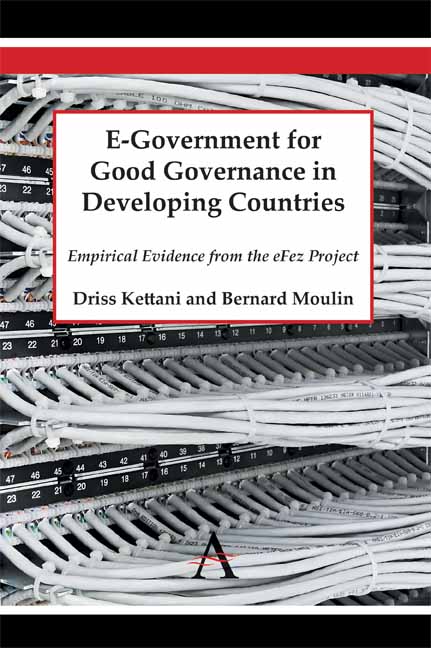E-Government for Good Governance in Developing Countries
Empirical Evidence from the eFez Project
Driss Kettani, Bernard Moulin
Select Format
Title Details
- ISBN: 9780857281258
- May 2014
- Pages: 298
- Imprint: Anthem Press
Unfortunately, developing countries and less developed countries in general have not yet entered the digital era. Most of them have not yet developed the back-office components that are fundamental prerequisites for conducting e-applications. In many situations, e-government systems have been adopted solely as window dressing, as it is considered improper for governmental agencies not to have a web portal, email address and/or a Facebook or Twitter account. But these government web portals are of no real use to the citizens. This volume seeks to help rectify this issue.
Drawing lessons from the eFez Project in Morocco, “E-Government for Good Governance in Developing Countries” offers practical supporting material to decision makers in developing countries on information and communication technologies for development (ICT4D), specifically e-government implementation. It documents the eFez Project experience in all of its aspects, presenting the project’s findings and the practical methods developed by the authors (a roadmap, impact assessment framework, design issues, lessons learned and best practices) in their systematic quest to turn eFez’s indigenous experimentations and findings into a formal framework for academics, practitioners and decision makers. The volume also reviews, analyzes and synthesizes the findings of other projects to offer a comparative study of the eFez framework and a number of other e-government frameworks from the growing literature.
Given the lack of practical books that target decision makers guiding the design and implementation of e-government for good governance and any other sector-specific ICT4D, the authors hope that the eFez Project’s great success in Morocco, and the outcomes and methods described in this volume, will prove a useful model for practitioners and decision makers in other developing countries around the world.
Driss Kettani is a professor of computer science in the School of Science and Engineering, Al Akhawayn University in Ifrane, Morocco. He specializes in information and communication technologies for development, with a focus on e-government systems.
Bernard Moulin is a professor of computer science in the Department of Computer Science and Software Engineering, Laval University, Québec City, Canada. He specializes in geo-simulation, modeling and e-government.
Acknowledgements; Foreword; Chapter I: Global Context; Chapter II: The Two Facets of ICT for Development; Chapter III: E-Government and E-Governance; Chapter IV: Evaluation of Outcomes/Impacts on Good Governance; Chapter V: Adopting a Transformative Approach in E-Government Systems Development; Chapter VI: A Generic Roadmap for ICT4D/E-Government Projects; Chapter VII: The eFez Project Roadmap; Chapter VIII: Technology Enablers for E-Government Systems; Chapter IX: Conclusion; Appendix: A synthetic View of Critical Issues for a Successful ITC4D/E-Government Project; References; Index
Related products
-
In the Name of Security – Secrecy, Surveillance and Journalism
Edited by Johan Lidberg, Denis Muller
May, 2018
£115.00 / $115.00 -
Angus & Robertson and the British Trade in Australian Books, 1930–1970
The Getting of Bookselling Wisdom
Jason D. Ensor
December, 2012
£115.00 / $115.00 -
The Status of the Translation Profession in the European Union
Anthony Pym, Claudio Sfreddo, Andy L. J. Chan, François Grin
September, 2013
£115.00 / $115.00 -
A Blogger’s Manifesto
Free Speech and Censorship in a Digital World
Erik Ringmar
October, 2007
£14.99 / $14.99 -
Knowledge Governance
Reasserting the Public Interest
Edited by Leonardo Burlamaqui, Anna Célia Castro, Rainer Kattel
foreword by Richard NelsonOctober, 2012
£115.00 / $115.00 -
Perceptions of the Press in Nineteenth-Century British Periodicals
A Bibliography
E. M. Palmegiano
February, 2012
£130.00 / $130.00







